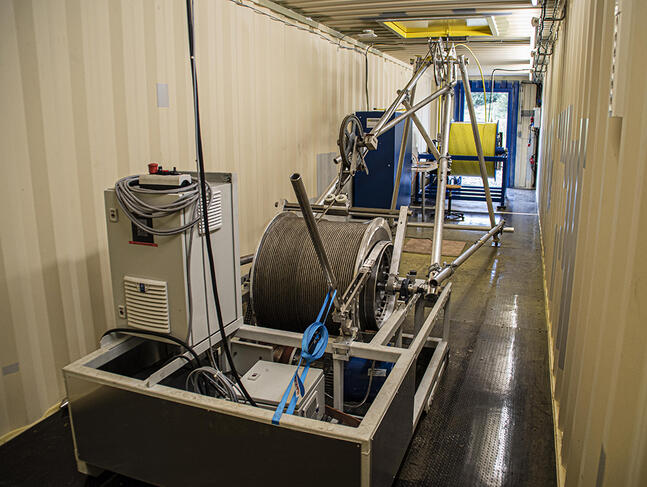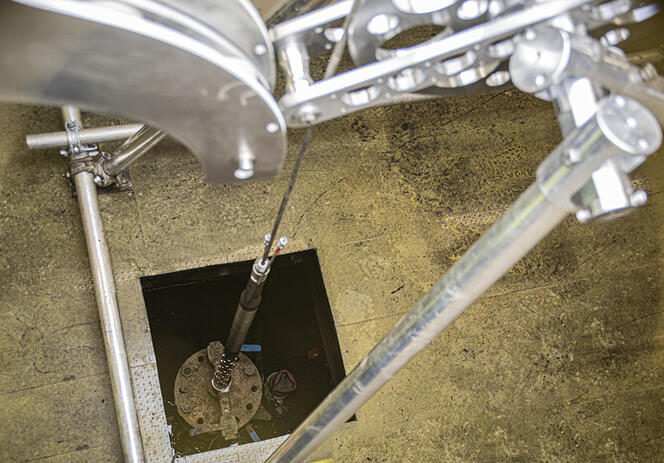
Posted on 03/22/2025 7:41:34 PM PDT by Red Badger
This discovery positions France to lead the charge in hydrogen production, boosting local economies.

Hydrogen renewable energy tanks in facility on the woods. (Representational image)
iStock
Scientists in France have made a groundbreaking discovery that could transform clean energy production. Beneath the soil of Folschviller, in the Moselle region, researchers have uncovered an astonishing 46 million tons of natural hydrogen.
This unexpected find has the potential to reshape global energy strategies by providing a new source of carbon-free fuel.
The discovery was made by scientists from the GeoRessources laboratory and the CNRS while they were searching for methane. Instead, at a depth of 4,101 feet (1,250 meters), they found an enormous deposit of white hydrogen.
This form of hydrogen is naturally occurring and does not require industrial production, unlike green hydrogen, which is made using renewable energy, or gray hydrogen, which is derived from fossil fuels.
To put this discovery into perspective, the newly found deposit represents more than half of the world’s annual gray hydrogen production—but without the environmental costs. If extracted efficiently, this resource could provide a clean, low-cost energy solution that eliminates CO₂ emissions entirely. Media reports estimate the discovery’s value to be approximately $92 billion.
White hydrogen: A game-changer for clean energy
For years, the hydrogen industry has faced two major challenges: the high cost of producing green hydrogen and the pollution caused by gray hydrogen. White hydrogen offers a solution to both problems. Since it already exists underground, it does not require energy-intensive processes like electrolysis, nor does it rely on fossil fuels.
If similar hydrogen deposits exist elsewhere, this could signal the beginning of a major shift in energy production worldwide. Countries that previously depended on expensive hydrogen production technologies may suddenly find themselves with a natural supply of this clean fuel.

The installation for monitoring underground gas levels, capable of taking measurements at depths down to 1,100 metres. Image credits: Laeticia Vançon pour GéoRessources
Dr. Jacques Pironon, a scientist involved in the study, highlighted the importance of this discovery: “Our research suggests that natural hydrogen could be far more abundant than previously thought. If we can find efficient ways to extract and use it, we may have a powerful new tool in the fight against climate change.”
This revelation could lead to an international race to locate and extract natural hydrogen reserves, potentially altering the global energy market and reducing reliance on traditional fossil fuels.

A close-up view from above of the SysMoG™ probe in position before being lowered into the borehole. The monitoring device was miniaturised to fit into a shaft 6 cm in diameter. Image credits: Laeticia Vançon pour GéoRessources
France’s opportunity to lead the hydrogen revolution
Lorraine, a region historically known for its coal and steel industries, is now at the center of a major energy breakthrough. This discovery offers France a unique opportunity to establish itself as a leader in white hydrogen production.
If properly developed, the hydrogen reserves in Moselle could create thousands of jobs, boost the local economy, and position France as a key player in Europe’s clean energy transition. Experts believe that tapping into these resources could strengthen energy security and reduce dependence on imported fossil fuels.
On a global scale, France’s success in extracting white hydrogen could encourage other nations to conduct their own geological surveys. Pironon emphasized the importance of further research: “We need to understand the full potential of these hydrogen reservoirs and develop safe, efficient methods to extract them.”
As the world moves toward greener energy solutions, France’s discovery of white hydrogen could mark the beginning of a new era in sustainable power.
The Green freaks won’t like this, either.
Um, what? What is “gray hydrogen” and “white hydrogen”?
Something doesn’t add up. This “enormous” deposit is half the world’s annual production of grey Hydrogen? Then this enormous deposit will be used up in two years? I think the article writer is missing somehthing - or else I am.
Can’t use it for energy.
Thousands of people die from dihydrogen monoxide poisoning every year.
“This form of hydrogen [white] is naturally occurring and does not require industrial production, unlike green hydrogen, which is made using renewable energy, or gray hydrogen, which is derived from fossil fuels.”.......................
Great! When you burn it’ll produce water vapor which is a much stronger green house gas than CO2.
H2O can be deadly.
$96 Billion? Lol! That’s like a day’s interest on our national debt.
Trump just added France to his Amazon shopping cart. 51st state.
I thought hydrogen can relatively easy in nuclear reactors. I’m not sure why I think that
I see this ending the way the Hindenburg did.
They actually found a hydrogen well.😲
Yep!.................
If they can scrape together another $8 billion they’d have enough to send to Ukraine.
I’m thinking... adding hydrogen to the atmosphere when it was not there before will cause it to combine with oxygen to form water. I wonder how much newly discovered hydrogen can be reacted in this manner before the free O2 content of the air starts to drop?
Fossil fuels have the advantage that their elemental components were all part of the biosphere before they became fossil fuels. Production of CO2 from burning the fossil fuels leads to increased plant growth, with the release of O2 into the air as a byproduct of converting CO2 into biological molecules through photosynthesis. And eventually all of that biomatter ends up converting back into fossil fuels.
But free H2... I don’t see right away where this has ever been part of the biosphere. I’m not a geologist, but it seems like maybe that was a pocket formed during the formation of the earth? Before going all gung-ho about extracting it, I’d want to do some heavy calculations to make sure the effect of using it will have minimal impact on the ratios of the various elements in the biosphere and atmosphere.
Elemental hydrogen leaves the Earth’s atmosphere and floats off into space driven by the solar wind.............
If you buy the canned stuff, it’s very stable. You just have to add water when you’re ready to use it.
“If we can find efficient ways to extract and use it, we may have a powerful new tool in the fight against climate change. This revelation could lead to an international race to locate and extract natural hydrogen reserves, potentially altering the global energy market and reducing reliance on traditional fossil fuels.”
“If, may, could, potentially” ... four weasel words in two sentences ...
Disclaimer: Opinions posted on Free Republic are those of the individual posters and do not necessarily represent the opinion of Free Republic or its management. All materials posted herein are protected by copyright law and the exemption for fair use of copyrighted works.